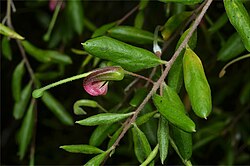Biology:Grevillea quadricauda
| Grevillea quadricauda | |
|---|---|

| |
| In the Hunter Region Botanic Gardens | |
| Scientific classification | |
| Kingdom: | Plantae |
| Clade: | Tracheophytes |
| Clade: | Angiosperms |
| Clade: | Eudicots |
| Order: | Proteales |
| Family: | Proteaceae |
| Genus: | Grevillea |
| Species: | G. quadricauda
|
| Binomial name | |
| Grevillea quadricauda Olde & Marriott[1]
| |
Grevillea quadricauda, commonly known as four-tailed grevillea,[2] is a species of flowering plant in the family Proteaceae and is endemic to eastern Australia. It is an erect, dense, bushy shrub with narrowly egg-shaped to elliptic leaves and small, loose clusters of green and pinkish-red flowers.
Description
Grevillea quadricauda is an erect, dense, bushy shrub that typically grows 1–2 m (3 ft 3 in–6 ft 7 in) high and wide and has purplish new growth. Its leaves are narrowly egg-shaped to narrowly lance-shaped with the narrower end towards the base or oblong to elliptic, 13–18 mm (0.51–0.71 in) long and 3–6 mm (0.12–0.24 in) wide, the upper surface with soft, shaggy hairs and the lower surface woolly-hairy. The flowers are arranged singly or in loose clusters of up to 4 on a woolly-hairy rachis 1–2 mm (0.039–0.079 in) long. The flowers are pinkish-red with a green base and style, the pistil 25–27 mm (0.98–1.06 in) long. Flowering mainly occurs from July to November and the fruit is an oval to oblong follicle 15–18 mm (0.59–0.71 in) long.[2][3][4][5][6]
Taxonomy
Grevillea quadricauda was first formally described in 1994 by Peter Olde and Neil Marriott in the journal Telopea from specimens collected in 1992.[3][7] The specific epithet (quadricauda) refers to four tail-like appendages on the flowers.[3]
Distribution and habitat
Four-tailed grevillea grows in woodland and forest, usually along creeks and watercourses and is found in a few locations near Helidon in south-east Queensland and a few locations near Whiporie and Grafton in north-eastern New South Wales.
Conservation status
Grevillea quadricauda is listed as "vulnerable" under the Australian Government Environment Protection and Biodiversity Conservation Act 1999 and the New South Wales Government Biodiversity Conservation Act 2016.[2][6] It was one of eleven species selected for the Save a Species Walk campaign in April 2016; scientists walked 300 km to raise money for collection of seeds to be prepared and stored at the Australian Plant Bank at the Australian Botanic Garden Mount Annan.[8]
References
- ↑ "Grevillea quadricauda". Australian Plant Census. https://biodiversity.org.au/nsl/services/apc-format/display/134793.
- ↑ 2.0 2.1 2.2 "Approved Conservation Advice for Grevillea quadricauda (Four-tailed Grevillea)". Australian Government Department of Climate Change, Energy, Environment and Water. https://www.environment.gov.au/biodiversity/threatened/species/pubs/64651-conservation-advice.pdf.
- ↑ 3.0 3.1 3.2 Olde, Peter M.; Marriott, Neil R. (1994). "A taxonomic revision of Grevillea arenaria and Grevillea obtusiflora (Proteaceae: Grevilleoideae).". Telopea 5 (4): 722–724. https://www.biodiversitylibrary.org/item/264633#page/144/mode/1up. Retrieved 13 November 2022.
- ↑ "Grevillea quadricauda". Australian Biological Resources Study, Department of Agriculture, Water and the Environment: Canberra. https://profiles.ala.org.au/opus/foa/profile/Grevillea%20quadricauda.
- ↑ Makinson, Robert O.. "Grevillea quadricauda". Royal Botanic Garden Sydney. https://plantnet.rbgsyd.nsw.gov.au/cgi-bin/NSWfl.pl?page=nswfl&lvl=sp&name=Grevillea~quadricauda.
- ↑ 6.0 6.1 "Four-tailed Grevillea - profile". Government of New South Wales Office of Environment and Heritage. https://www.environment.nsw.gov.au/threatenedspeciesapp/profile.aspx?id=10375.
- ↑ "Grevillea quadricauda". APNI. https://id.biodiversity.org.au/instance/apni/557062.
- ↑ Barlass, Tim (10 April 2016). "Scientists race to save 11 endangered plants in NSW". Sydney Morning Herald. http://www.smh.com.au/environment/conservation/race-to-save-11-endangered-plants-in-nsw-20160408-go1yxf.html.
Wikidata ☰ Q15581817 entry
 |


